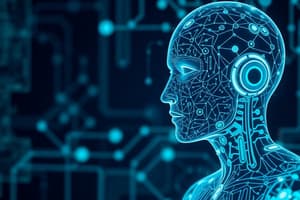Podcast
Questions and Answers
What are some benefits of virtual tutors in education?
What are some benefits of virtual tutors in education?
Virtual tutors offer simulations, gamification, and interactive tools to help students understand and retain complex concepts.
What challenges are associated with the integration of virtual tutors in education?
What challenges are associated with the integration of virtual tutors in education?
Challenges include concerns about data privacy, ethical considerations, and the potential for algorithmic bias.
How can virtual tutors help bridge educational disparities?
How can virtual tutors help bridge educational disparities?
Virtual tutors can provide high-quality education regardless of geographic location or socio-economic background.
What is the future outlook of education with AI?
What is the future outlook of education with AI?
Why is it important to consider ethical considerations in the integration of AI technologies in education?
Why is it important to consider ethical considerations in the integration of AI technologies in education?
How do virtual tutors contribute to personalized learning experiences?
How do virtual tutors contribute to personalized learning experiences?
How do virtual tutors enhance the learning experience of students?
How do virtual tutors enhance the learning experience of students?
In what situations can virtual tutors be particularly useful for students?
In what situations can virtual tutors be particularly useful for students?
Where can virtual tutors be integrated for student support?
Where can virtual tutors be integrated for student support?
How do virtual tutors promote personalized learning?
How do virtual tutors promote personalized learning?
What benefits do virtual tutors offer in terms of student engagement?
What benefits do virtual tutors offer in terms of student engagement?
How can virtual tutors help students identify their strengths and weaknesses?
How can virtual tutors help students identify their strengths and weaknesses?
Flashcards are hidden until you start studying
Study Notes
AI in Education: Virtual Tutors
Artificial Intelligence (AI) is increasingly being integrated into the educational sector to enhance the learning experience. One of the most significant aspects of AI in education is the development of virtual tutors. These AI-powered tools are designed to provide personalized tutoring and support to students outside the traditional classroom setting.
Virtual Tutors in Education
Virtual tutors are AI-based systems that can provide students with real-time feedback, guidance, and support. They can be particularly useful in situations where students need individualized attention or have difficulty understanding complex concepts. Virtual tutors can be integrated into various educational platforms, such as online learning management systems, educational apps, or even specialized software designed for specific subjects.
Personalized Learning
Virtual tutors can analyze a student's learning progress and adapt the content and pacing to their individual needs. This approach allows students to learn at their own pace, reducing the pressure they might feel in a traditional classroom setting. They can also provide instant feedback, which can help students identify their strengths and weaknesses and work on areas that need improvement.
Enhanced Student Engagement
Virtual tutors can provide an interactive learning experience, making education more engaging and enjoyable for students. They can offer simulations, gamification, and other interactive tools that can help students better understand and retain complex concepts.
Universal Access to Education
Virtual tutors can help bridge the gap in educational opportunities by providing access to high-quality education regardless of geographic location or socio-economic background. This can be particularly beneficial for students in remote areas or those who cannot afford access to private tutors.
Challenges and Concerns
Despite the benefits, the integration of virtual tutors in education also raises concerns, including data privacy, ethical considerations, and the potential for algorithmic bias. It is crucial that AI technologies are developed and implemented in a way that respects student privacy and does not discriminate against certain groups of students.
Future of Education with AI
The future of education with AI is promising, offering opportunities to revolutionize traditional learning methods and bridge educational disparities. However, it is essential to strike a balance between innovation and ethics to ensure the successful integration of AI into the educational landscape.
In conclusion, virtual tutors represent an exciting development in the field of AI in education. They offer personalized, interactive, and accessible learning experiences, which can help students achieve their potential and thrive in an increasingly digital world.
Studying That Suits You
Use AI to generate personalized quizzes and flashcards to suit your learning preferences.




